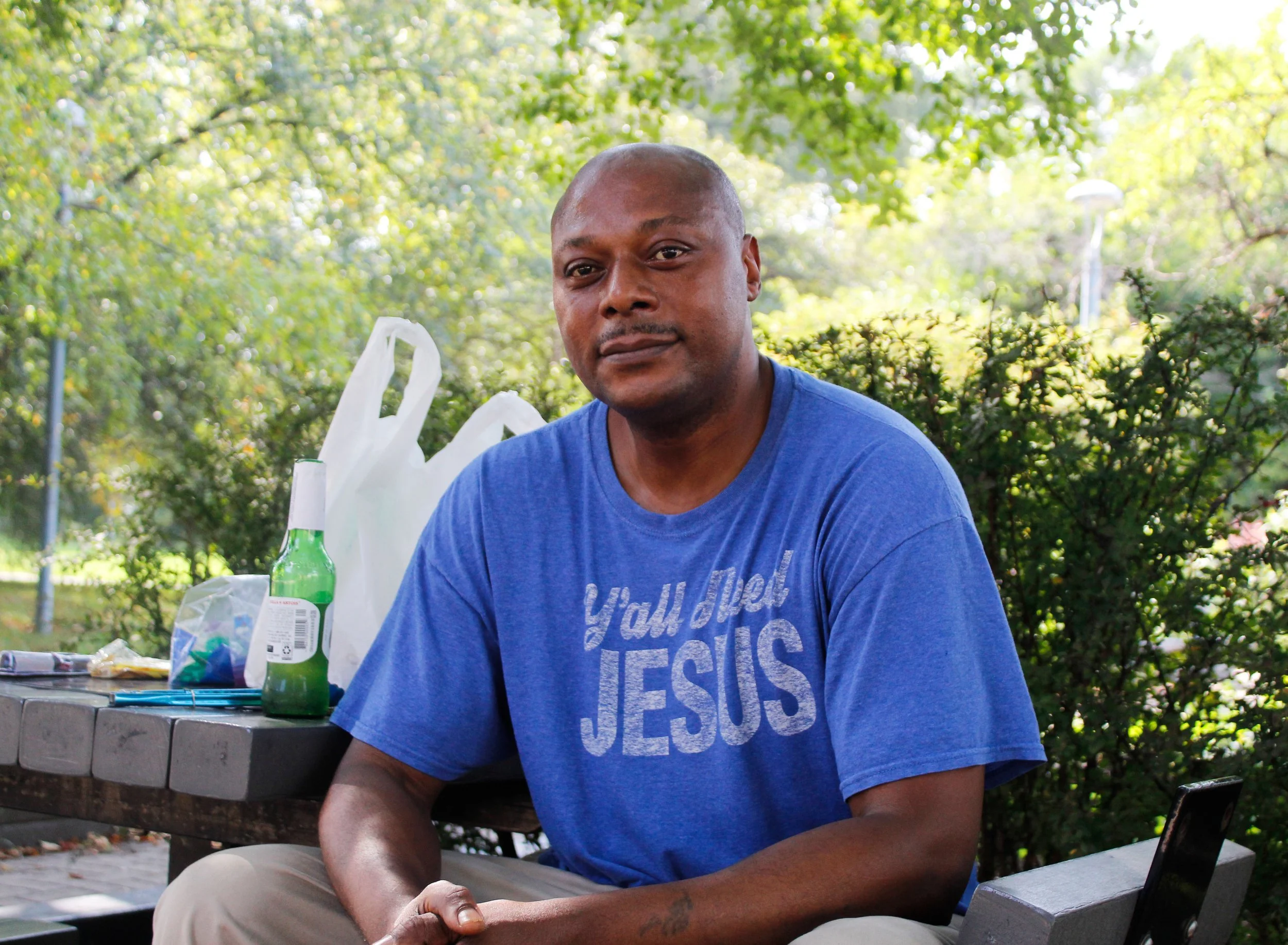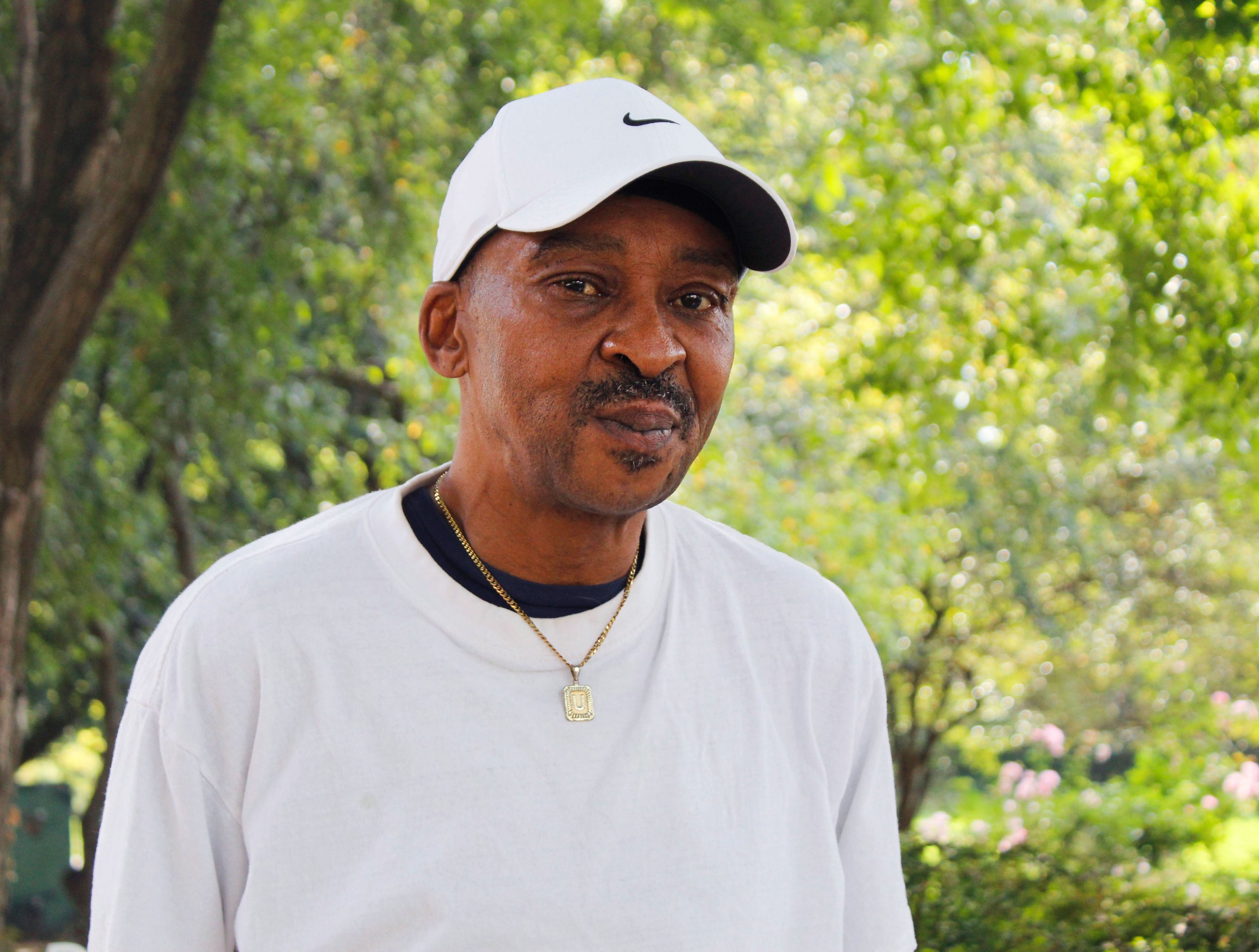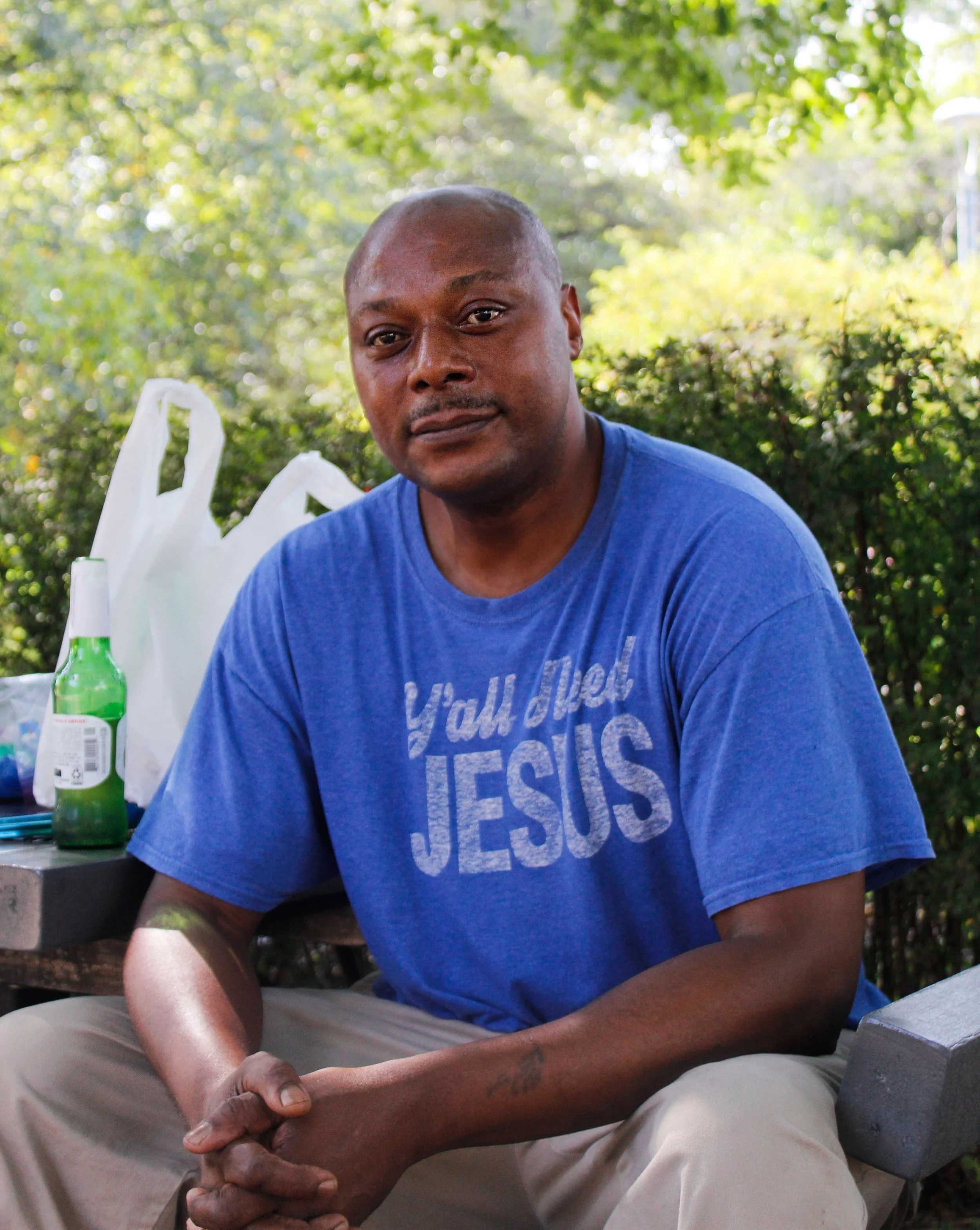Through outreach or mentorship, many are eager to connect across age groups and pass down their knowledge and wisdom.
By Zulema Luz Herrera and Jorge Iván Soto
Tony McNeal spends his Sunday afternoon barbecuing in Nichols Park with a friend in Hyde Park, on Sept. 21, 2025. He said he was impressed by the different ways he sees generations and communities supporting each other. “Chicago to me, you can go anywhere and somebody will help you.” (Sofía Oyarzún/for City Bureau).
Good mentors and role models are key to growing up, and in Hyde Park, some neighbors are worried there aren’t enough to go around.
City Bureau Civic Reporting fellows spoke with people representing Generations X to Z at Nichols Park in the Hyde Park neighborhood about the intergenerational spaces in their lives.
Hyde Park skews younger than the city as a whole, with 20- to 34-year-olds making up the largest age group as of 2023, according to data from the Chicago Metropolitan Agency for Planning. Around 42% of residents are 35 and older.
Older residents remember growing up in a community where everyone looked out for each other and helped guide young people, but it doesn’t always feel as connected now. Some rediscovered those bonds after moving to different neighborhoods and communities. Some younger Gen Zers already are taking up the role of mentors and eager for those opportunities. .
In conversations, current and former South Siders talked about how they try to connect across age groups, whether through mental health and trauma support, educational opportunities, or mutual understanding and kindness.
These conversations have been edited and condensed for clarity.
Scott Noble spends time in Nichols Park in Hyde Park, grilling a variety of food with his friend to share with passersby on Sept. 21, 2025. (Sofía Oyarzún/for City Bureau).
Nichols Park
Nichols Park sits near a bustling 53rd Street, with various stores, restaurants and cafes, and the University of Chicago campus a short walk away. Community members are in or around the park getting their groceries for the week, taking an afternoon stroll, walking their dogs or catching up with friends over coffee.
Scott Noble, 60, a resident of Hyde Park for about 10 years, grew up in Englewood. He is the president of the Unity Network Community nonprofit organization, or “UNC,” that does trauma and mental health outreach to young Black men. He set up at the park with his friend, Tony McNeal. They have a grill and a table filled with homemade sandwiches, soda, water and chips that they hand out free to the public. People would ask him, “Unc, you got a sandwich?" From there, he can spark conversations.
Where do you see intergenerational relationships in your life?
I am president of a nonprofit male trauma outreach team, [and] my goal is to connect African-American men to safe providers. When you talk about men — it doesn’t matter what race, [but] especially African-American men — [some people think] a man should take any type of abuse — if you’re a man suck it up, move on, don’t cry — but it doesn’t work like that.
When I was growing up, if something went wrong, you go to church, and they’ll pray for you. You didn’t take psych meds, you didn’t tell anybody. You just suck it up and move on, especially if you are a man. But men have issues, too, so I try to connect them to services.
How has growing up changed from your generation to the current one?
When I was growing up, there was more snatching purses; [but] if [adults] found that you snatched somebody’s purse, you got dealt with, because that was somebody’s mother or neighbor. Do you think I wouldn't think for a moment one of these kids would knock me upside my head for this phone? So people are like, ‘Why would I even be bothered to go out helping people?’
So what I do is I go to high-risk areas. With all the violence, it's a little uncomfortable talking about age and generation. There is nowhere in the world my parents would let me get away with things kids do now. There’s no way you could ever disrespect the elders, calling them by their name, pick on somebody. These things these kids do now to homeless people; I have clients outside sleeping, and a guy would walk up and stomp on him. There was just certain things that we couldn’t do.
What do you hope for future generations?
I hope for men to realize they’re the kings and to be who they are, no matter what. Step up, because women carry a big load now. My mom was the breadwinner in the family, but back then, women stuck with their men no matter what. But now women tell you, ‘I don’t need you.’ Kids have no male role models; men need to step up. Things are going to get rough.
Michele Johnson, 28, is a vintage boutique owner and elementary school teacher. Her mobile shop, SBQ Premium Finds, sells vintage clothes targeting 27- to 35-year-olds. On this day, she is based across from Nichols Park on a patch of grass where customers sift through racks of clothes and boxes filled with options like jackets, skirts and high-knee boots. She promotes her pop-up locations in Chicago on her TikTok account, @SBQpremiumfinds.
What generation do you consider yourself to be part of? What is your generation known for?
I think I mostly resonate with Gen Z because it's more unique, new fresh ideas, more creative people. I know one thing [known about Gen Z] is a focus on mental health and wellness. I don't want to overwork myself; I’m not just going to be working for years and years just to wait for retirement and be in burnout.
What are the intergenerational spaces you encounter in your life?
My little sisters are Gen Z, but most of my friends are in between Gen Z or millennials. I am a teacher, too, so I think that generation is Gen Alpha. I teach K-5, so they’re very young, they're very loving, they are very sweet. I do feel like they're behind school-wise, but it’s been fine. I think they’re behind because the education system sucks right now — basically everything kind of sucks right now. Not enough teachers, not enough resources, things like that.
What do you hope for the future generations?
Better education, more realistic benefits for entrepreneurs, better insurance, and better retirement plans for entrepreneurs.
Dawn McDowell strolls E. 53rd Street in Hyde Park with her friend on Sept. 21, 2025. (Sofía Oyarzún/for City Bureau).
Dawn McDowell, 46, grew up on the North and South sides. She has experienced firsthand the rapid gentrification of Uptown but believes that community and care starts at home and in the family. McDowell was spending some time shopping with her friend, Karonn Lee.
How do you see generational relationships play out in your life?
It starts at home. I have a little bit of the North Side lifestyle in me, but I was raised on the South Side. My entire family was raised in the South Side. Growing up there, it was just family and everybody [in the neighborhood] raising everybody and helping everybody out. I had grandparents, aunties, my mother, my father, lots of cousins, and ‘cousins’ who are not cousins, you know? Folks I grew up with were basically family.
Have you seen more cohesion or division in your communities over time or as you navigated different spaces?
Well there’s a lot of division, and I mainly saw that in my age range. A lot of us just had to grow up. Many of us at 18 or 19 years old, we had to leave. Those of us who lived at home, once we had kids — and I have a 24-year-old daughter — we were able to leave with values instilled in us already. So we were able to set the tone for the 2000s babies. Some of us, we left and left our community behind. It can be difficult to want to come back and have our children see what we saw growing up. And you see that it’s gotten a little more severe now.
The community is just different; those of us who left have a hard time coming back and keeping the community going for the next generation. That wasn’t our purpose; our purpose was to get out so we can see different things, experience different things and give our children something different.
What would you like to say to your daughter and to her generation — and the generations to come?
I tell my daughter all the time, especially when she was a kid: ‘Stay a kid. Let me structure you, let me discipline you the right way, so when it’s time for you to go out, you’re ready. The world is cruel, kids are cruel.’ Every day I had to tell her these types of things. She’s going to have to grow up and be a woman, so me being a mother, a woman myself, I have to teach her that, I have to get that instilled in her, because she’s got to leave the nest. Of course she can leave and always come home, but the biggest thing for me is the structure, the discipline, the guidance in order to go.
Karonn Lee, 43, grew up in a tight-knit community in Roseland and now lives in the south suburbs. Visiting Hyde Park with her friend, Dawn McDowell, she hopes to continue to learn and pass down the lessons she experienced to her daughter.
How did you see generational relationships play out in your life?
With family, and mainly playing and traveling. Basically the same as [Dawn]. We have family down South. So road trips, but in our neighborhood, you know, neighbors were neighbors. They took care of the kids, they could discipline children without the parents saying anything. You trusted your neighbors. Like [Dawn] said, it starts at home.
Now it seems like neighbors are ready to fight over the simplest things, so you can’t do that anymore. It’s rare to find, and kids aren’t playing with each other anymore. I play Double Dutch with my kids, but you just don’t see that.
Where have you seen cohesion or division between generations?
I’d say it really depends on what’s happening in the community, i.e. shootings, death. That’ll really bring the community together, but [only] for a certain amount of time. But mostly, it’s division.
A lot of people lost sight of morals and family values within the community. And it’s because of the parents. The neighborhoods aren’t the same; they’re basically the opposite of where we grew up. To me, it’s up to the [current] generation [of parents and elders] who still have to teach the next generation. But if parents don’t learn that, they can’t teach it unless they get it from somewhere else. Some of my daughter’s kids don’t have parents like us, so we take them in and teach them.
How have you seen these divisions in your communities, or do you see more cohesion?
I’m in a different community now. I’m in the south suburbs, in Lansing. I’d say there’s more [unity] out there. It’s more old school, and there’s a lot of different races out there.
There are no racial issues, my neighbor’s Italian, across from that we have Mexican, and we’re all together. We barbecue, we take care of each other’s stuff, we say, ‘hello,’ and it’s just not like that in the city. It’s different.
What would you like to tell younger generations?
I give advice all the time; it’s almost a problem. But if I had to, I’d say don’t judge a book by its cover. You don’t know who a person is, what they’re going through, or who they could be to you.
I’d say don’t hate. There’s too much hate in this world, and a lot of it has been passed down. If that chain is broken … I could talk about that world forever.
On another note, don’t let anyone tell you you can’t do anything. I’ve seen a lot of kids go a lot of places they didn’t think they could go. Go with your gut and don’t let nobody defer you from your dreams.
Sam Fulton, 23, is a first-year graduate student at the University of Chicago pursuing a degree in physics. A Gen-Zer who may feel a cross between the TikTok generation and the old guard, he looks forward to connecting further with his peers and hopes to excite the new generation through science as he gets to know Hyde Park.
Within this community, have you seen a lot of cohesion or division between generations?
I think what’s nice about UChicago is that, even though a lot of the faculty are older, they’re very connected to the community and they really care about outreach and make an effort to be connected to the younger community in the area.
I think we’re lucky to be here, honestly. Being able to work with older generations, those who are more connected with the younger generations. It’s unique; there hasn’t been as much of a division between the generations that go here.
Have you seen the faculty or events put on by UChicago to facilitate that?
Yes, we actually have the South Side Science Fair coming up. That’s an excellent time for young kids from the community to be able to interact with some of the students here, the faculty, and we see multiple generations coming together to talk about science and learn more about science.
What about the outreach to institutes like Kenwood Academy or people under 18?
I know a lot of people in my program that are involved in community outreach. It’s something I’d love to do — pulling younger people from diverse backgrounds and getting people involved in STEM here at the University of Chicago. I think it would be an awesome experience.
Tony McNeal, 56, is of Black and Cherokee descent and grew up on the North Side. He attended Lincoln Park High School, where he excelled in basketball and hoped to play in college until he blew out his knee. He attended Truman College, receiving a license in electrical plumbing and painting, which helped him open a business. Working on buildings in Hyde Park is how he met and befriended Scott Noble [interviewed above].
In what spaces have you seen different generations come together and interact?
Up in Edgewater, and down here in Hyde Park mostly. This community is unbelievable. One time I was in Ace Hardware, and a lady, who didn’t know me from nowhere. She said, ‘I need somebody to paint my room.’ The owner of the Ace Hardware said I could do it. I gave her a $1,500 estimate, and she ended up giving me $1,700.
Tony McNeal. (Sofía Oyarzún/for City Bureau).
While walking down 53rd, I’ve seen strangers come up to homeless folks and ask them if they’re OK, or if they need a place to stay for the night.
There’s so many cultures and people here. For some reason, Chicago to me, you can go anywhere and somebody will help you. You don’t even have to ask for it; they can see it. It’s hard to find.
In these communities, have you seen more inclusivity, or division?
I haven’t seen any divides at all. There was a block party near Cornell and Garfield. The produce place [donated] all this food out the store. Everybody came through. That’s nearly impossible anywhere else. And they told me they do this every other year..
What message would you give younger generations?
One of the main reasons I’m an open-minded individual is that I grew up with our grandparents, our moms, and they would say, ‘I can’t get through to the youth, why aren’t they listening?’
Well, how about listening to them [the kids] for a change? Listen to them and see if you can add anything to it. They didn’t ask you for nothing; they just ask you to listen, but you’re doubting them. You don’t know what’s going with them. You never know what the youth are going through.
I believe the youth are trying their best, but they do need some guidance, too, instead of putting them down all the time.
Zulema Luz Herrera is a Chicana journalist and musician from Chicago. A third-generation Mexican immigrant, Herrera has journalism degrees from University of Illinois Urbana-Champaign and University of Arizona, where she produced a documentary on food insecurity in Tuscon and created visual media for a local immigrant services organization.
Jorge Iván Soto is an Indigenous Mexican-American advocate and musician. In his Iowa hometown, they began writing op-eds and speaking on local media to advocate for the local factory workers affected by the COVID-19 outbreak. He sketches buildings, bikes and advocates for housing and public transit. He plays league soccer and DJs at local gigs.
They are part of the Fall 2025 cohort of City Bureau’s Civic Reporting Fellowship. Support our program by becoming a recurring donor.




